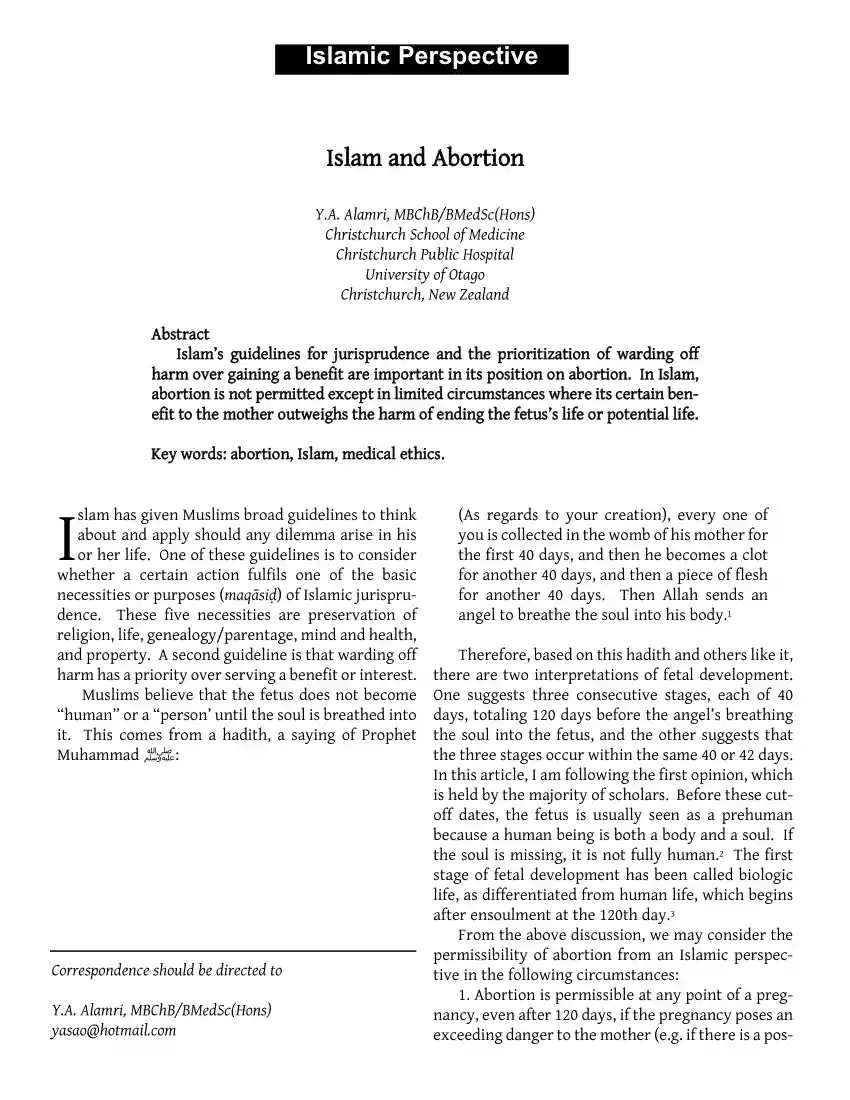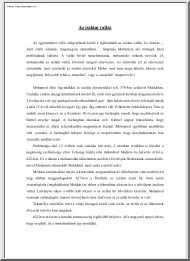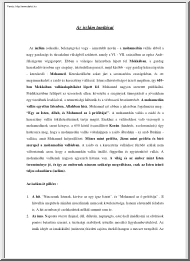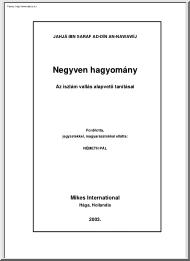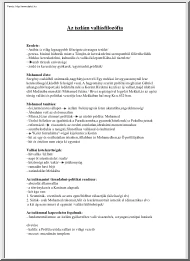Datasheet
Year, pagecount:2011, 2 page(s)
Language:English
Downloads:2
Uploaded:August 09, 2018
Size:513 KB
Institution:
-
Comments:
University of Otago
Attachment:-
Download in PDF:Please log in!
Comments
No comments yet. You can be the first!Most popular documents in this category
Content extract
Source: http://www.doksinet Islamic Perspective Islam and Abortion Y.A Alamri, MBChB/BMedSc(Hons) Christchurch School of Medicine Christchurch Public Hospital University of Otago Christchurch, New Zealand I Abstract Islam’s guidelines for jurisprudence and the prioritization of warding off harm over gaining a benefit are important in its position on abortion. In Islam, abortion is not permitted except in limited circumstances where its certain benefit to the mother outweighs the harm of ending the fetus’s life or potential life. Key words: abortion, Islam, medical ethics. slam has given Muslims broad guidelines to think about and apply should any dilemma arise in his or her life. One of these guidelines is to consider whether a certain action fulfils one of the basic necessities or purposes (maqāsiḍ) of Islamic jurisprudence. These five necessities are preservation of religion, life, genealogy/parentage, mind and health, and property. A second guideline is that warding off
harm has a priority over serving a benefit or interest. Muslims believe that the fetus does not become “human” or a “person’ until the soul is breathed into it. This comes from a hadith, a saying of Prophet Muhammad ﷺ: Correspondence should be directed to Y.A Alamri, MBChB/BMedSc(Hons) yasao@hotmail.com jima.imanaorg (As regards to your creation), every one of you is collected in the womb of his mother for the first 40 days, and then he becomes a clot for another 40 days, and then a piece of flesh for another 40 days. Then Allah sends an angel to breathe the soul into his body.1 Therefore, based on this hadith and others like it, there are two interpretations of fetal development. One suggests three consecutive stages, each of 40 days, totaling 120 days before the angel’s breathing the soul into the fetus, and the other suggests that the three stages occur within the same 40 or 42 days. In this article, I am following the first opinion, which is held by the
majority of scholars. Before these cutoff dates, the fetus is usually seen as a prehuman because a human being is both a body and a soul. If the soul is missing, it is not fully human.2 The first stage of fetal development has been called biologic life, as differentiated from human life, which begins after ensoulment at the 120th day.3 From the above discussion, we may consider the permissibility of abortion from an Islamic perspective in the following circumstances: 1. Abortion is permissible at any point of a pregnancy, even after 120 days, if the pregnancy poses an exceeding danger to the mother (e.g if there is a pos- JIMA: Volume 43, 2011 - Page 39 Source: http://www.doksinet wa amalihi wa shaqāwatihi wa sa`ādatihi. Hadith no 2643. Available at http://wwwmuhadithorg 2. Al-Munajjid MS Abortion after the soul has been breathed into the foetus. Available from: http://www.islam-qacom/en/ref/13319/abortion%20after%20the%20soul Accessed Dec 26, 2010 3. Yaseen MN The inception of
human life in the light of statements of the Holy Qur’an and Sunnah and the opinions of Muslim scholars. J Islam Med Assoc 1990;22:159-67. Available from http://jimaimanaorg /article/view/5696. 4. Khorfan R, Padela AI The bioethical concept of life for life: abortion when the mother’s life is in danger in Judaism, Catholicism, and Islam. J Islam Med Assoc 2010;42:99-105. Available from http://jimaimana org/article/view/5351. 5. Al-Munajjid MS Abortion of physically deformed foetus. Available from http://www.islamqacom/en/ref/12118 Accessed Dec 26, 2010 6. IMANA Ethics Committee Islamic medical ethics: the IMANA perspective. J Islam Med Assoc 2005;37:33-42. Available from http://jima. imana.org/article/view/5528 7. Al-Munajjid MS Abortion of pregnancy resulting from rape. Available from http://wwwislamReferences qa.com/en/ref/13317/rape%20pregnancy Accessed 1. Ṣaḥīḥ Muslim Kitāb al-qadar Bāb kayfiyya al-khalq Dec 26, 2010 al-ādamī fi baṭn ummihi wa kitāba rizqihi wa
ajalihi sibility that she could die).2,4 2. Abortion before 120 days of conception is treated on a case-by-case basis, with the previous rules kept in mind. For example, it is permissible if the mother’s health is endangered or if the fetus is found to have an abnormality that is lethal or will cause severe disability.5,6 3. If pregnancy results from a circumstance beyond a woman’s will (e.g rape), she is allowed to keep the child. If the woman does not want to keep the child, she may terminate the pregnancy within 120 days from conception. The closer the abortion is to the time of conception, the better. After 120 days from conception, she should continue to carry the fetus until birth, and Muslims should assist her in raising her child should she need help.7 In conclusion, it is apparent how complicated the issue of abortion can be. Preservation of the mother’s life is a priority over the life of the fetus, given that all medical resources to preserve both lives have been
exhausted.4 After all, it is her life that we are certain of saving when aborting the pregnancy, as opposed to the probable life we save when taking the chance of continuing the pregnancy. JIMA: Volume 43, 2011 - Page 40 jima.imanaorg
harm has a priority over serving a benefit or interest. Muslims believe that the fetus does not become “human” or a “person’ until the soul is breathed into it. This comes from a hadith, a saying of Prophet Muhammad ﷺ: Correspondence should be directed to Y.A Alamri, MBChB/BMedSc(Hons) yasao@hotmail.com jima.imanaorg (As regards to your creation), every one of you is collected in the womb of his mother for the first 40 days, and then he becomes a clot for another 40 days, and then a piece of flesh for another 40 days. Then Allah sends an angel to breathe the soul into his body.1 Therefore, based on this hadith and others like it, there are two interpretations of fetal development. One suggests three consecutive stages, each of 40 days, totaling 120 days before the angel’s breathing the soul into the fetus, and the other suggests that the three stages occur within the same 40 or 42 days. In this article, I am following the first opinion, which is held by the
majority of scholars. Before these cutoff dates, the fetus is usually seen as a prehuman because a human being is both a body and a soul. If the soul is missing, it is not fully human.2 The first stage of fetal development has been called biologic life, as differentiated from human life, which begins after ensoulment at the 120th day.3 From the above discussion, we may consider the permissibility of abortion from an Islamic perspective in the following circumstances: 1. Abortion is permissible at any point of a pregnancy, even after 120 days, if the pregnancy poses an exceeding danger to the mother (e.g if there is a pos- JIMA: Volume 43, 2011 - Page 39 Source: http://www.doksinet wa amalihi wa shaqāwatihi wa sa`ādatihi. Hadith no 2643. Available at http://wwwmuhadithorg 2. Al-Munajjid MS Abortion after the soul has been breathed into the foetus. Available from: http://www.islam-qacom/en/ref/13319/abortion%20after%20the%20soul Accessed Dec 26, 2010 3. Yaseen MN The inception of
human life in the light of statements of the Holy Qur’an and Sunnah and the opinions of Muslim scholars. J Islam Med Assoc 1990;22:159-67. Available from http://jimaimanaorg /article/view/5696. 4. Khorfan R, Padela AI The bioethical concept of life for life: abortion when the mother’s life is in danger in Judaism, Catholicism, and Islam. J Islam Med Assoc 2010;42:99-105. Available from http://jimaimana org/article/view/5351. 5. Al-Munajjid MS Abortion of physically deformed foetus. Available from http://www.islamqacom/en/ref/12118 Accessed Dec 26, 2010 6. IMANA Ethics Committee Islamic medical ethics: the IMANA perspective. J Islam Med Assoc 2005;37:33-42. Available from http://jima. imana.org/article/view/5528 7. Al-Munajjid MS Abortion of pregnancy resulting from rape. Available from http://wwwislamReferences qa.com/en/ref/13317/rape%20pregnancy Accessed 1. Ṣaḥīḥ Muslim Kitāb al-qadar Bāb kayfiyya al-khalq Dec 26, 2010 al-ādamī fi baṭn ummihi wa kitāba rizqihi wa
ajalihi sibility that she could die).2,4 2. Abortion before 120 days of conception is treated on a case-by-case basis, with the previous rules kept in mind. For example, it is permissible if the mother’s health is endangered or if the fetus is found to have an abnormality that is lethal or will cause severe disability.5,6 3. If pregnancy results from a circumstance beyond a woman’s will (e.g rape), she is allowed to keep the child. If the woman does not want to keep the child, she may terminate the pregnancy within 120 days from conception. The closer the abortion is to the time of conception, the better. After 120 days from conception, she should continue to carry the fetus until birth, and Muslims should assist her in raising her child should she need help.7 In conclusion, it is apparent how complicated the issue of abortion can be. Preservation of the mother’s life is a priority over the life of the fetus, given that all medical resources to preserve both lives have been
exhausted.4 After all, it is her life that we are certain of saving when aborting the pregnancy, as opposed to the probable life we save when taking the chance of continuing the pregnancy. JIMA: Volume 43, 2011 - Page 40 jima.imanaorg
